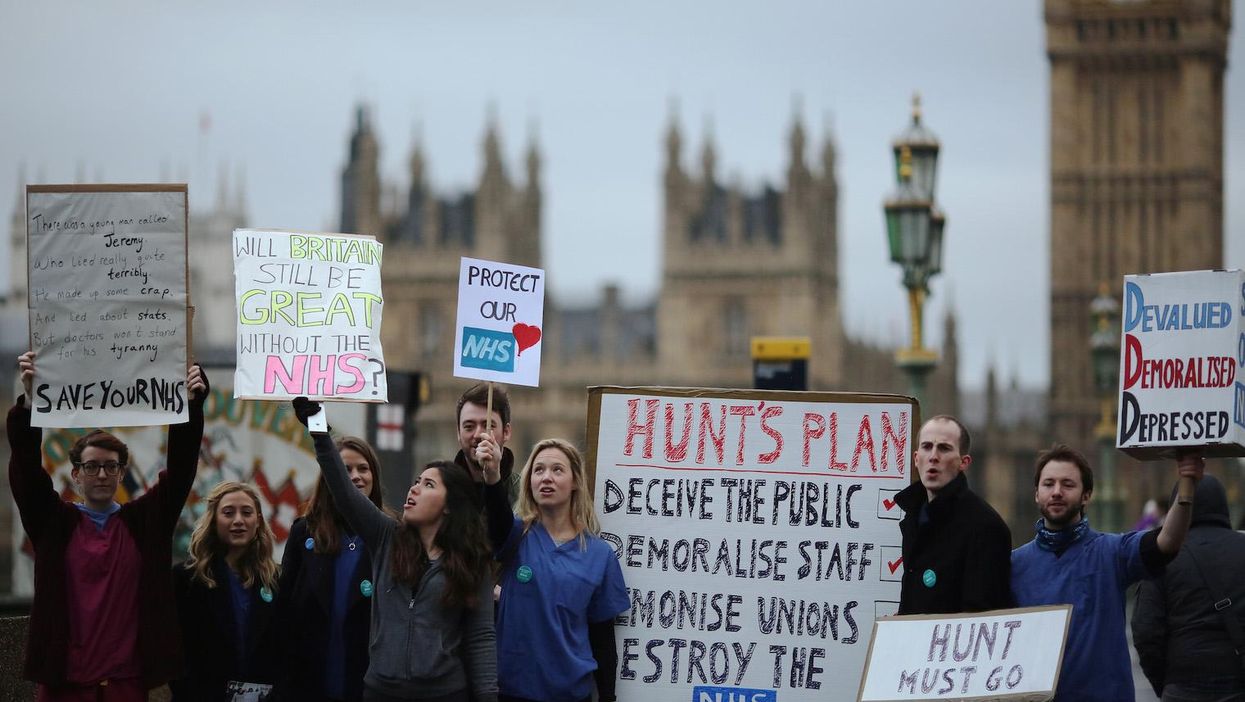News
Louis Dor
Mar 12, 2016

Picture: Dan Kitwood/Getty Images
Public sector pay increases have been capped at 1 per cent for the last four years.
Meanwhile, MPs are set to be given their second pay rise in ten months, of nearly £1,000.
Tim Farron, leader of the Liberal Democrats has called on the Chancellor to give public sector workers a pay rise, calling the freeze a political decision:
Public sector workers have been denied a pay rise now for too long. It is time for the Government to thaw the cap on pay for our nurses and teachers.
When MPs are being given another pay rise it is indefensible for the Chancellor to continue to ignore the plight of our public sector workers.
I am calling on the chancellor to put the public ahead of politicians in next week’s budget and give Britain the pay rise it deserves.
Let's look at a few reasons why this might be a good idea, especially when compared to MPs' pay rises:
1. 'If you want the best people for the job you need to pay them...'
It's a line often trotted out by both public sector workers and MPs when discussing pay rises - so why are MPs apparently exempt from the freeze experienced elsewhere in the public sector?
Partly because MP pay is regulated by an independent body called the Independent Parliamentary Standards Authority (IPSA).
In a consultation for the 2015 pay rise (you know, the one before the extra £962), IPSA said:
MPs are an indispensable part of our parliamentary democracy. Our duty is to provide a package of remuneration which, while still modest by professional standards, does not deter people from entering political life, nor confine it to the independently wealthy. This is what our decisions are designed to achieve.
Does the same argument not apply for people wanting to become doctors, counsellors, teachers, law enforcement and nurses?
2. The public sector feel utterly disempowered and scrutinised
A recent Opinium survey found only 7 per cent of public sector workers (including both middle managers and skilled workers) consider their workplace to be empowering.
Twenty-five per cent think their current leadership team is not able to effectively lead the team over the next decade and 66 per cent say this is because leadership only cares about how they are perceived, and does not care for their employees.
Meanwhile, MPs clearly don't care at all how they are perceived, if Friday's filibustering over an NHS anti-privatisation bill is anything to go by...
3. Junior Doctors and Jeremy Hunt
The criticism of the contempt the government holds for the public sector reached a nadir with Jeremy Hunt's contract for junior doctors.
When asked in a January survey who was most to blame for the dispute between the BMA and the government, leading to strike action, 45 per cent said the government.
Thirty per cent said both equally, 12 per cent said the BMA and 13 per cent said they did not know.
The number who believe it is the Government's fault has grown to a majority of 57 per cent in March, according to a recent Ipsos MORI poll.
4. Almost every section of the army thinks the freeze is unfair
The Telegraph has reported that the Armed Forces Pay Review has found that the pay freeze is undermining morale.
The report said:
On our visits, there was more dissatisfaction expressed over pay levels and the one per cent increase than previously.
Almost every group we spoke with considered the increase to be unreasonable when compared with inflation and the increases in accommodation and food charges. Personnel made the case that one per cent was a real-terms pay cut and that it was unfair.
Some questioned our independence and many thought that pay increases should match those in the private sector, while others thought that any increase above one per cent would help to boost morale and commitment.
5. MPs widely objected to a pay rise in 2015, citing a negative climate around the proposal
Again, this is the pay rise prior to the most recent one.
Labour MP Alan Johnson's response was indicative of the feeling from most MPs, when he said:
It cannot be right that Members of Parliament receive such a substantial increase, which will damage our standing with the constituents we serve, and once again lead to the reputation of Members of Parliament being besmirched... Please think a bit again about this – at the very least you should put your report on hold with a view to implementing it when conditions allow.
The government also responded with a letter from the leader of the House of Commons, which noted:
A pay rise of this nature at this time is not appropriate.
The TaxPayers’ Alliance also did not support the increase.
IPSA's response to this testimony was to say MPs secretly want a pay rise, based on the results of a YouGov survey from 2012.
6. The teacher brain drain
A National Audit Office report in February found the number of teachers leaving the profession increased by 11 per cent over three years, while the government continues to fall short of recruitment targets.
Some have argued this is due to the compensation, as fee-paying schools can sweep up the best teachers while publicly-funded schools are unable to compete.
Although it'll be hard to ever compete with fee-paying schools, and it should be acknowledged teachers go into the profession for reasons other than pay, breaking the freeze would probably help stop young teachers leaving the profession due to morale and poor conditions.
7. Police promises broken on spending
Osborne's big funding fanfare was headed by a promise to the police to protect their budgets, saying:
Now is not the time for further police cuts, now is the time to back our police.
The UK Statistics Authority head, Sir Andrew Dilnot, has ruled that Osborne’s claims of “real-terms protection” in last November’s autumn statement was incorrect.
The authority found that forces has actually seen a £160m real-terms cut in their Whitehall funding in 2015-16 and 2016-17.
This is roughly equal to the salaries of 3,200 police officers over the two years.
8. 'We're all in this together'?
It's notable that the Chancellor's former slogan is not said as often any more, as private sector earnings rise and the economy recovers, as do MPs salaries. It's not hard to see why, when the public sector remains at one per cent. Are we really all in this together?
Picture: Sean Gallup/Getty ImagesMore: Nearly half of us blame the government for the junior doctors' strike
Top 100
The Conversation (0)













